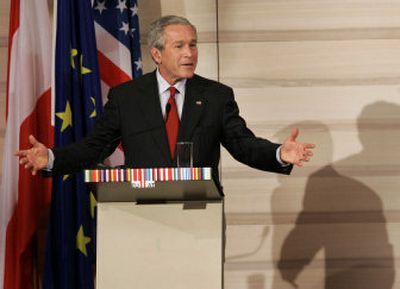Critics of U.S. policy rankle Bush in Vienna

VIENNA, Austria – President Bush responded angrily Wednesday to differences with Europe over the war in Iraq and the U.S. treatment of prisoners at Guantanamo Bay, but won renewed expressions of unity from the European Union on nuclear nonproliferation.
European leaders reaffirmed the need to halt Iran’s uranium enrichment program and to contain North Korea’s arms program.
With public opinion surveys showing a growing animosity in Europe toward the United States amid fears that its anti-terrorism policies and the Iraq war are endangering global stability, the president lashed out during a news conference, raising his voice and several times using the words “absurd” and “absurdity” to describe the criticism.
At the same time, he offered a restrained answer to Iran’s announcement earlier in the day that it would wait until late August to respond to the latest proposal from the United States and five other nations. The proposal offers economic, political and technological incentives if Iran suspends its nuclear program. The U.S. and its partners fear Tehran is seeking to make a nuclear weapon; the Iranians insist their pursuit of uranium enrichment is for the peaceful use of nuclear energy.
“It shouldn’t take the Iranians that long to analyze what is a reasonable deal,” said Bush.
He similarly made only a mild rebuke to North Korea, which U.S. officials say is engaged in steps that suggest it is preparing to test a missile thought to be capable of reaching U.S. bases in Japan and Guam and possibly Alaska or Hawaii.
“This is not the way that peaceful nations conduct their affairs,” Bush said.
Bush won broad agreement on the nuclear issues from Austrian Chancellor Wolfgang Schuessel, who holds the rotating EU presidency and who played host to the Vienna meeting.
But for the most part, the post-meeting news conference with Schuessel brought to the fore the differences with which Bush is wrestling on a two-day visit to central Europe.
The treatment of detainees at Guantanamo Bay, Cuba, and accusations that the U.S. has sent prisoners to countries that practice torture have become focal points for the broader opposition to U.S. policies in Iraq and its anti-terrorism campaign. The U.S. reportedly has transferred such detainees through European airports or over European air space.
Responding to a reporter who said that “most consider the United States the biggest threat to global stability,” Bush said: “That’s absurd. … We’ll defend ourselves, but at the same time, we’re actively working with our partners to spread peace and democracy. So whoever says that is – it’s an absurd statement.”
Moments later, when asked whether the United States was promoting or hindering world peace, Bush said: “I thought it was absurd for people to think that we’re more dangerous than Iran. We’re a transparent democracy. People know exactly what’s on our mind. We debate things in the open. We’ve got a legislative process that’s active.”
Bush spent much of his day in one of the great monuments of old Europe: the Hofburg Palace, a massive structure and the former seat of the Austro-Hungarian Empire.
Later he flew to Budapest, Hungary, for a second day drawn up around his overarching effort to explain the reasons for the Iraq war in the more politically friendly territory of postcommunist eastern Europe.
As Bush prepared to leave Vienna, a protest by several thousand people holding signs opposing the war in Iraq and other Bush policies filled the Mariahilferstrasse, a main shopping street, marching peacefully toward the Hofburg.